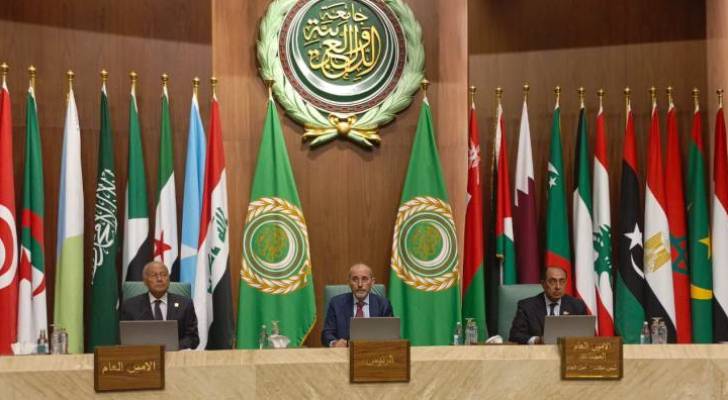Jordan chairs Arab ministerial committee condemning ‘Israeli’ violations in Jerusalem
Jordan’s Deputy Prime Minister and Minister of Foreign Affairs and Expatriates, Ayman Safadi, chaired the tenth meeting of the Arab ministerial committee tasked with international action against ‘Israeli’ illegal measures in occupied Jerusalem.
The meeting took place at the Arab League headquarters in Cairo on the sidelines of the 164th ordinary session of the Arab League Council at the ministerial level.
Jordan reviews efforts to protect Jerusalem
At the start of the meeting, Safadi outlined the committee’s work since its ninth session in April, highlighting Jordan’s efforts to rally international support to halt ongoing ‘Israeli’ violations targeting Jerusalem’s Islamic and Christian holy sites.
He linked these violations to the escalating ‘Israeli’ aggression in the Al-Aqsa Mosque/Al-Haram Al-Quds Al-Sharif, the ongoing assault on Gaza, and increased tensions in the West Bank.
Read more: Jordan FM issues stark warning on 'Israel and Gaza'
Palestinian briefing on crimes and occupation
The committee heard a briefing from Palestinian Foreign Minister Farisin Shahin, who described the “crimes of aggression and acts of genocide” committed by ‘Israel’. Shahin highlighted systematic targeting of Jerusalem through settlement expansion, Hebraization policies, killings, arrests, home demolitions, and attempts to erase the city’s Arab identity.
She also warned of daily Al-Aqsa incursions by extremist groups, illegal excavations beneath the site, and the colonial E1 settlement plan that threatens to isolate Jerusalem from its Palestinian surroundings.
Broad Arab condemnation of ‘Israeli’ actions
In its final statement, the committee strongly condemned:
- Settlement expansion, including approval of the E1 plan to encircle and isolate the Old City.
- Unprecedented violations against Al-Aqsa Mosque/Al-Haram Al-Quds Al-Sharif, including incursions by ‘Israeli’ ministers and extremists, and the allowance of settlers performing religious rituals, singing, dancing, and raising ‘Israeli’ flags inside the mosque compound.
- Arbitrary restrictions on Muslim worshippers, especially during Ramadan and Fridays.
- Threats to the Christian presence in Jerusalem, including freezing of the Greek Orthodox Patriarchate’s bank accounts, attacks on clergy, churches, monasteries, and cemeteries, and harassment of Christian worshippers.
Reaffirming Jordanian custodianship and international law
The ministers reaffirmed that:
- ‘Israel’ has no sovereignty over Jerusalem and its Islamic and Christian holy sites; East Jerusalem is the capital of a future Palestinian state on the June 4, 1967 lines.
- UN resolutions, including Security Council resolutions 252, 267, 476, 478, and 2334, and UNESCO decisions, recognize Al-Aqsa Mosque’s 144-dunum area as exclusively for Muslim worship and part of World Heritage sites.
- The historic Hashemite custodianship over Jerusalem’s Islamic and Christian holy sites is essential to protect their Arab, Islamic, and Christian identity, and Jordan’s Ministry of Awqaf is the sole authority managing Al-Aqsa/Al-Haram Al-Quds Al-Sharif.
- The role of the Jerusalem Committee and Bayt Mal Al-Quds Agency is critical in safeguarding the city’s holy sites.
Five-point international action plan
The committee agreed on a five-point plan:
- Strengthen coordination with the Organisation of Islamic Cooperation to amplify joint efforts to protect Jerusalem.
- Document ‘Israeli’ violations at regional and international organizations to highlight breaches of international law.
- Mobilize an active international stance against attempts to alter the historic and legal status of Al-Aqsa/Al-Haram Al-Quds Al-Sharif.
- Push for international measures to halt attacks on holy sites, stop settler violence, and hold ‘Israeli’ authorities accountable.
- Task Arab League missions and member-state ambassadors to build on recent international positions condemning extremist ‘Israeli’ actions and issue a strong global stance, warning of their consequences on regional and international peace and security.
The Jordan-led committee includes Iraq, Tunisia, Algeria, Somalia, Saudi Arabia, Palestine, Qatar, Egypt, Morocco, Tunisia, and the Arab League Secretary-General.




